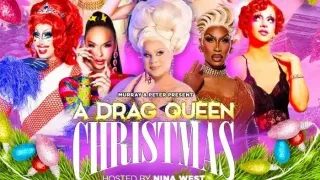July 19, 2022
Jewish Film Festival Faves
Brian Bromberger READ TIME: 8 MIN.
The Jewish Film Institute (JFI) has announced its program for the 42nd San Francisco Jewish Film Festival, the world's largest and longest one, running July 21-August 7. It is presenting 71 films from 14 countries.
"This year's stellar Festival lineup makes visible a full range of Jewish voices, identities, and perspectives, at a time when social divisions run deep and mainstream depictions often fail to recognize the full diversity of Jewish experiences," said Jay Rosenblatt, Program Director, in the announcement.
Reintroducing in-person cinema after two years at the Castro Theatre and Albany Twin Theater, the festival will also showcase 14 dynamic programs in the JFI Digital Screening Room for at home-viewing from August 1-7. There are a few films exploring life and love in today's queer community as well as past generations.
"Bernstein's Wall" screened at last year's Mill Valley Film Festival last year. It pays homage to this musical genius but isn't afraid to expose his faults, telling his story in his own words through the use of archival concert material, first-person TV interviews, news footage, home movies, letters, and audio clips.
A musical prodigy, Bernstein got the break of a lifetime when he replaced the ill conductor of the New York Philharmonic in November 1943, catapulting the 25-year-old to fame. He gave wide-ranging music lectures on the CBS art series "Omnibus" in 1954, and in his 1970s televised series of "Young People's Concerts," as well as composing music for Broadway and Hollywood, including "On the Town" and "West Side Story."
Although homosexual, Bernstein had a long, somewhat happy, though complicated 27-year marriage to Chilean actress Felicia Montealegre until her 1978 death. He had male lovers before, during, and after their marital union. Felicia knew about his sexuality and told him to go off and do what he pleases, "without guilt or confession."
The documentary is illuminating up to a point. Bernstein had so many accomplishments, this film that could've been longer. However, it emphasizes Bernstein's humanitarian and political concerns, and his belief that art could and should promote social change, to the detriment of his musical achievements, unbalancing the film.
Still, his legacy lives on in conductors like Michael Tilson Thomas and Marin Alsop, who were influenced by his theatrical style and musicianship.
There have been many films on gay conversion therapy but mostly from a Christian point of view. In "The Therapy," we are exposed to two Israeli Orthodox Jews using this discredited psychological technique to overcome their gay feelings. The documentary begins with chilling footage of actual therapy sessions, with one man tied up with a quilt over his head as he's bombarded with questions and accusations about his sexuality.
We are introduced to Lev, age 54. Aware of his same-sex attractions since puberty, he hoped to change himself, got married, and had six children. His wife discovered gay porn on his computer and filed for divorce. Lev's been in conversion therapy for eight years, trying to rid himself of these desires and remarry.
Ben, age 23, has spent seven years in therapy, and was expelled from his Hebrew school because he was attracted to another male student. He attended a secular university, studying social work. Through academic research and conversations with a clinical psychology professor, he realizes how harmful conversion therapy can be. Yet, can he break away from it?
Both their stories occur as the Israeli Knesset debated whether conversion therapy should be made illegal, with both men testifying on opposite sides of this contentious issue. We won't spoil the ending, but this searing explosive exposé should help convince more people the necessity of outlawing this abusive and dangerous practice.
Before #MeToo there was Andrea Dworkin, the iconoclastic outspoken radical feminist intellectual who wrote and spoke about rape, sexual abuse, pornography, and domestic violence at a time when they weren't forefront in public consciousness as women's civil rights issues. She connected race and class to gender issues, especially misogyny and patriarchy, decades prior to the emergence of the term intersectionality.
The new hybrid documentary "My Name Is Andrea" features a stunning collection of archival clips of speeches, radio interviews, television appearances in which the abrasive Dworkin eloquently, passionately, and uncompromisingly addresses women's status in American society.
This film includes texts and dramatic reenactments by actresses such as Ashley Judd and Christine Lahti, among others, playing Dworkin at key life moments, such as when she was raped and her first husband physically abused her. Many people assailed her as an ugly, fat, angry lesbian, even though she was primarily straight, married twice, the second time successfully to a gay man.
The documentary shows what a fearless fighter she was, despite facing death threats. Filmmaker Pratibha Parmar clearly views Dworkin as a misunderstood prophet, with hurt and outrage being her prime motivations, and implicitly argues her career needs to be reassessed and appreciated.
The problem is that Dworkin was enormously divisive and confrontative in her public appearances, especially on the issue of pornography, even denouncing the work of self-described feminist pornographers, which she saw as degrading to women. Both other feminists, leftists and queer peers critiqued her extreme positions. But you will find none of this criticism in the film.
This is one documentary that would've benefitted from a few talking heads, putting Dworkin in historical context. The dramatizations are heartfelt and powerful, but pale in comparison to Dworkin herself, who was her own best advocate.
The documentary does force the viewer to reconsider Dworkin as an underestimated force in American feminism, but a more honest evaluation of her pros and cons would significantly have strengthened the film's impact.
Moral ambiguity in a satirical parable, and dark comedy about gentrification and white guilt, reigns supreme in Idan Haguel's narrative Israeli film "Concerned Citizen." The movie cleverly focuses on the insidious interaction between privilege and prejudice in a gay 'enlightened' well-off couple (Ben and Raz) living in Neve Sha'anan, a migrant slum-ridden neighborhood in south Tel Aviv. They are in the process of seeking a surrogate for their planned child.
To improve the gritty surroundings, Ben plants a new fragile tree on his street. One night he looks outside his window and sees two young African immigrants leaning on the tree, almost breaking. Ben files a police complaint. He later observes one of the officers brutally beating one of the men, but does nothing, throwing him into a spiral of guilt that affects his self-understanding and relationship with Raz. The film raises the question of how tolerant we are, with a suppressed xenophobia uncomfortably rising to the surface, poking fun at liberal self-delusion.
The lead actors are a real-life couple and the immigrants in the movie are actual refugees from Sudan and Eritrea, which adds depth to the story. However, ultimately there are significant lapses in the screenplay. The movie is told almost totally from Ben's viewpoint, so we hardly hear from his partner Raz or the refugees' perspective. The ending is morally ambiguous, which some might find disturbing and not particularly emotionally satisfying.
The captivating local narrative short "Holding Moses" is the star attraction for LGBTQ+ viewers in this festival, and is in the Jews in Shorts: Documentary Program I. Butch queer woman and Broadway dancer Randi Rader has a child, Moses. Because of a rare genetic disorder, he was born profoundly disabled. Randi struggles with shock, fear, and grief, even wishing he would die quickly.
But it is her love of movement, honed from performing with the Broadway musical "Stomp" and dancing Butoh on a Japanese farm – along with her fondness of percussive rhythms as a kind of somatic wisdom – that becomes her lifeline.
Watching a father play with his disabled son on a trampoline gives her hope, as she will use dance to connect with Moses. Randi exclaims, "He was my teacher in terms of how to love him. I'm the one who had to change," allowing her guilt to dissolve.
She learns a new language in order to communicate with Moses, involving handclaps, foot stomps, back pats, even banging dishes so she can mother him.
Just when you think the world is going to hell in a hand basket, a gift like "Holding Moses" appears to resurrect our faith in the life force that flows into a river of love and empathy, connecting us with the rest of the world. The film deservedly won second place for the Bay Area Short Prize at SFFilm. Not to be missed under any circumstances, "Holding Moses" is why we love film festivals.
Help keep the Bay Area Reporter going in these tough times. To support local, independent, LGBTQ journalism, consider becoming a BAR member.






